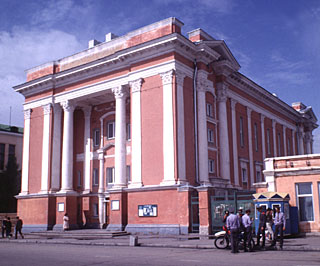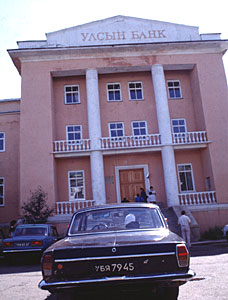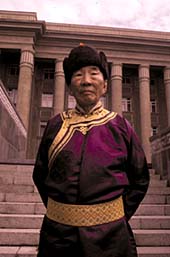Yakking Up Mongolian Finance
A young descendent of Genghis Kahn is trying to lead his nomadic countrymen on a capitalistic romp after seven decades of Russian repression, but the broker is finding it hard to convince investors to buy stock in a land where that always referred to animals
By Ron Gluckman / Mongolia
T
HE SUN RISES ABOVE THE SPECTACULAR STEPPES of northern Mongolia, and the only noise is the pounding of hoofs as horsemen hurry into the bush village of Moeroen. They rein in their mounts beside a small building and take their place in an already long line. Suddenly the door opens and an old nomad steps out. His grizzled face breaks into a smile as he shoves a fistful of papers overhead. "I've bought Aluminum Mine shares!" he shouts to the crowd. Five hundred kilometers away in Ulan Bator, the mastermind of the Mongolian Stock
Exchange is playing pool outside his office -- the most modern office in the country. He
sips coffee from a New York Stock Exchange mug, souvenir of the first Mongolian pilgrimage
to Wall Street. He wears a Chicago Bulls basketball cap and a Club Med T-shirt.
Five hundred kilometers away in Ulan Bator, the mastermind of the Mongolian Stock
Exchange is playing pool outside his office -- the most modern office in the country. He
sips coffee from a New York Stock Exchange mug, souvenir of the first Mongolian pilgrimage
to Wall Street. He wears a Chicago Bulls basketball cap and a Club Med T-shirt.
He turned 28 this summer. Naidansurengiin Zolzhargal, boy wonder of international finance, is chain-smoking Marlboros in his castle. Zolzhargal, who uses only one name in the Mongolian tradition and tells friends to call him Zolo, has just made a difficult bank shot. "Luck," he laughs.
So far Zolzhargal's luck has been running hot, but many wonder how long it will last. "My enemies are many," he says, "but I'm too powerful for them. They'll make my life quite miserable, but I won't give up easily."
Fitting words from a reformer who claims to be a direct descendant of 13th-century military genius Genghis Khan. Since opening the Mongolian Stock Exchange in February, Zolzhargal has assembled an economic fighting force that would make his ancestor proud. His handpicked staff of 30 brokers works behind a battery of personal computers, rare in a country that lacked even fax lines last summer. His headquarters is inside the old Children's Cinema, just off Lenin Street on Sukhbator Square. The refurbishing, reportedly costing $4.5 million, included bathrooms with self-flushing toilets and hand dryers.
Zolzhargal is the guiding force of an ongoing economic revolution in Mongolia, where radical reforms promise to purge state holdings at a faster rate than anywhere in Eastern Europe or the former Soviet Union. By the end of 1993, Zolo and his free-marketeers intend to transfer 80 percent of state-owned assets to private hands. The process began with the distribution of coupons used to bid on small businesses at state auctions or invest in the exchange. Every Mongolian citizen received three pink coupons, each valued at 1,000 tugriks (then $25, but now about $5 at official rates) and one blue voucher, valued at 7,000 tugriks (now $35). Zolzhargal is using the coupons in a grand game of free-market Monopoly, teaching the essentials of investment in a nomadic nation where all assets have been controlled by the central government for 70 years, and private ownership of livestock wasn't permitted until 1990.
 "All the capital goods in a communist country constitutionally belong to the
people," Zolzhargal explains. "So why should they have to buy them again?
Instead, in Mongolia, we are going to give the assets away on an equal opportunity
basis."
"All the capital goods in a communist country constitutionally belong to the
people," Zolzhargal explains. "So why should they have to buy them again?
Instead, in Mongolia, we are going to give the assets away on an equal opportunity
basis."
The process, praised by admiring Western observers, involves enormous risks. Zolzhargal himself expects hundreds of the new companies to go bankrupt, wiping out any benefit to the new investors.
Yet the potential for change is vast. By using a free-for-all bidding process, Mongols themselves will set the value of consumer goods and companies. If, for example, a dozen lambs trade for two blue coupons, and a bread stand for seven pinks, then the bread stall is worth six lambs. Unconventional, undoubtedly, but so is the notion of a market economy in this sparsely populated nation that has been locked away from the rest of the world for centuries.
Thus far, the reforms have not yielded the expected returns. Zolzhargal, who was educated in Hungary and studied finance in the U.S., remains defiant of critics who point to widespread shortages of everything from fuel to basic foodstuffs, while unemployment, unknown under the communists, has soared above 20 percent.
"To expect things to be running smoothly overnight is absurd," he says, stubbing out a cigarette and lighting another. "It's like expecting a child to be self-sufficient. This system is just being born. It needs someone to feed and nurture it. Of course, the process of support should be as short as possible."
Zolzhargal thinks salvation could come with an infusion of cash from foreigners when the market opens to outside investment. He hopes that will happen next year. But there are numerous obstacles.
Most daunting is the country's economy. The economic collapse of the former Soviet Union has devastated Mongolia, which relied on the U.S.S.R. for 80 percent of its cross-border trade. Imports fell by 61 percent in 1991; exports by 55 percent. Runaway inflation has dragged the value of the tugrik from 40 to the U.S. dollar in 1991 to 200 to $1 in 1992. At a time when government austerity seems imperative, authorities have responded by printing money freely to meet payrolls and, according to Zolzhargal, using pension funds to finance enormous budget deficits that in the past were covered by Soviet subsidies. The result in real terms has been the rationing of everything from vodka and bread to milk, meat and matches.
The June elections, in which the renamed communist party was swept back to power in a landslide victory, is another cause for concern. Zolzhargal has also had to weather the controversy surrounding his 35-year-old brother, Zhargalsaikhan, who was ousted from his post as head of the State Bank last year after losing more than $100 million of the country's cash reserves in futures and foreign currency speculation.
Despite this litany of troubles, Zolzhargal seems undaunted. "The outlook depends on your point of view, really," he says. "If you look at the election, things seem depressing. But if you look at all we've done so far, it's extraordinary."
 Indeed, the
exchange has expanded greatly since trading began on February 7. The exchange was
initially open one day a week for two hours. Transactions were scribbled on scraps of
paper, prices marked on a blackboard. Just three companies were listed and the first
week's turnover was a mere 16,000 shares, valued at $15,000.
Indeed, the
exchange has expanded greatly since trading began on February 7. The exchange was
initially open one day a week for two hours. Transactions were scribbled on scraps of
paper, prices marked on a blackboard. Just three companies were listed and the first
week's turnover was a mere 16,000 shares, valued at $15,000.
By the end of March, weekly trading had risen to 200,000 shares. In July, the exchange expanded to two five-hour days of trading, and weekly volume topped 650,000 shares. "We have to privatize [$1.25 million] a week," Zolzhargal says. "That's my goal. If we can accomplish that in two days, then on the other three days, I can concentrate on [setting up systems for] secondary trading, cash, mutuals, everything you expect in a true free-market economy."
Western observers say the test will be the secondary trading phase. "All they're doing now is reshuffling," says Tim Frost, program director of the New York-based Financial Services Volunteer Corps, which brought a number of American investment specialists to Mongolia to train exchange staff. "They gave out coupons. It's like play money at this stage. That's different from getting people to invest real money."
Yet Leon Weil, a New York financial adviser and former U.S. ambassador to Nepal, has high praise for the exchange and its young director. "Sure, it's a bit like Monopoly," he says. "It was radical, but I don't know that you could have made it work any other way."
Weil adds: "A lot of people in Mongolia have ideas, but few have the verve to make them happen. Zolo has vision, drive, energy." Others aren't as admiring. "He's a punk," says an American economist based in Ulan Bator. "In the West he'd be running a 7-Eleven, or robbing it. You know, a paper-pusher dreaming of the big score. Here in Mongolia he's made that score."
In fact, even Zolzhargal concedes his meteoric rise "could happen only in a place like Mongolia."
The Boy Wonder of the Mongolian Stock Exchange isn't willing to rest while reform is lagging. Next on his agenda are banking and monetary deficiencies. "This government is taking half steps when they need to take full steps," he says. "They have to float the tugrik, but they're afraid it will become worthless. What's the problem? If it's worthless, it's worthless. So what if it goes to 1,000 to a dollar? Look at the lire. It's over 1,000 to a dollar, and Italy's strong. The important thing is for our money to have real value.
"In Mongolia, the economic situation is unforeseeable, even to an insider like me," adds Mongolia's maverick, managing a mischievous smile. "There are a lot of people working against reforms. But if they try and slow things, I'll just step up the pressure."
Ron Gluckman is an American journalist based in Hong Kong, who travels widely around the Asian region for a variety of publications, including Asia, Inc., which ran this story in 1992. For additional reports by Ron Gluckman from Mongolia, please click on Mongo-bike Nightmare, Buddhism on the Rise, or Alternative Olympics.
To return to the opening page and index

push here
[right.htm]